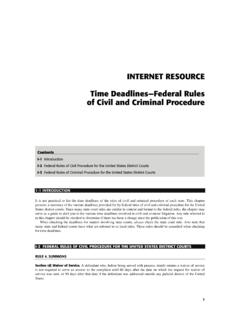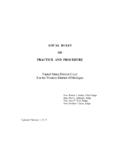Transcription of FEDERAL RULES OF CIVIL PROCEDURE - Westlaw
1 FEDERAL RULES OFCIVIL PROCEDUREE ffective December 1, 2007 FEDERAL RULES OF CIVIL PROCEDUREWest is pleased to provide you with the revised FederalRules of CIVIL PROCEDURE , which became effective onDecember 1, 2007. This booklet replaces the FEDERAL RULES of CIVIL Procedurebooklet published in July 2007. You can also access the revised FEDERAL RULES of CivilProcedure on Westlaw by completing the following steps:1. At the tabbed Law School page, access the FederalRules database (US- RULES ) by typing us-rulesin theSearch these databasestext box in the left At the database Search page, type ci(frcp)in the Searchtext box. 3. At the displayed result list, click the title of a rule toview its full you know the citation of the rule you want toretrieve, use the Find service. For example, to retrieve Civ. P. 26, type frcp 26in the Find by citationtext boxin the left frame of the tabbed Law School page. FEDERAL RULES OF CIVIL PROCEDURE1 ClassroomResourcesnFEDERAL RULES OF CIVIL PROCEDUREFEDERAL RULES OF CIVILPROCEDURERule 1.
2 Scope and PurposeThese RULES govern the PROCEDURE in all CIVIL actions andproceedings in the United States district courts, except asstated in Rule 81. They should be construed andadministered to secure the just, speedy, and inexpensivedetermination of every action and 2. One Form of ActionThere is one form of action the CIVIL 3. Commencing an ActionA CIVIL action is commenced by filing a complaint with 4. Summons(a) Contents; Amendments.(1) Contents. A summons must:(A) name the court and the parties;(B) be directed to the defendant;(C) state the name and address of the plaintiff's attorneyor if unrepresented of the plaintiff;(D) state the time within which the defendant must appearand defend;(E) notify the defendant that a failure to appear anddefend will result in a default judgment against thedefendant for the relief demanded in the complaint;(F) be signed by the clerk; and(G) bear the court's RULES OF CIVIL PROCEDURE (2) Amendments. The court may permit a summons to beamended.
3 (b) Issuance. On or after filing the complaint, the plaintiffmay present a summons to the clerk for signature and the summons is properly completed, the clerk must sign, seal, and issue it to the plaintiff for service on thedefendant. A summons or a copy of a summons that isaddressed to multiple defendants must be issued for eachdefendant to be served.(c) Service.(1) In General. A summons must be served with a copy ofthe complaint. The plaintiff is responsible for having thesummons and complaint served within the time allowedby Rule 4(m) and must furnish the necessary copies to theperson who makes service.(2) By Whom. Any person who is at least 18 years old andnot a party may serve a summons and complaint.(3) By a Marshal or Someone Specially Appointed. At theplaintiff's request, the court may order that service bemade by a United States marshal or deputy marshal or bya person specially appointed by the court. The court mustso order if the plaintiff is authorized to proceed in formapauperis under 28 1915 or as a seaman under 28 1916.
4 (d) Waiving Service.(1) Requesting a Waiver. An individual, corporation, orassociation that is subject to service under Rule 4(e), (f), or(h) has a duty to avoid unnecessary expenses of serving thesummons. The plaintiff may notify such a defendant thatan action has been commenced and request that theFEDERAL RULES OF CIVIL PROCEDURE3 ClassroomResourcesnFEDERAL RULES OF CIVIL PROCEDURE defendant waive service of a summons. The notice andrequest must:(A) be in writing and be addressed:(i) to the individual defendant; or(ii) for a defendant subject to service under Rule 4(h), toan officer, a managing or general agent, or any other agentauthorized by appointment or by law to receive service ofprocess;(B) name the court where the complaint was filed;(C) be accompanied by a copy of the complaint, twocopies of a waiver form, and a prepaid means forreturning the form;(D) inform the defendant, using text prescribed in Form 5,of the consequences of waiving and not waiving service;(E) state the date when the request is sent;(F) give the defendant a reasonable time of at least 30 daysafter the request was sent or at least 60 days if sent tothe defendant outside any judicial district of the UnitedStates to return the waiver; and(G) be sent by first-class mail or other reliable means.
5 (2) Failure to Waive. If a defendant located within theUnited States fails, without good cause, to sign and returna waiver requested by a plaintiff located within the UnitedStates, the court must impose on the defendant:(A) the expenses later incurred in making service; and(B) the reasonable expenses, including attorney's fees, ofany motion required to collect those service expenses.(3) Time to Answer After a Waiver. A defendant who,before being served with process, timely returns a waiverneed not serve an answer to the complaint until 60 days4 FEDERAL RULES OF CIVIL PROCEDURE after the request was sent or until 90 days after it wassent to the defendant outside any judicial district of theUnited States.(4) Results of Filing a Waiver. When the plaintiff files awaiver, proof of service is not required and these rulesapply as if a summons and complaint had been served atthe time of filing the waiver.(5) Jurisdiction and Venue Not Waived. Waiving service of a summons does not waive any objection to personaljurisdiction or to venue.
6 (e) Serving an Individual Within a Judicial District of theUnited States. Unless FEDERAL law provides otherwise, anindividual other than a minor, an incompetent person, ora person whose waiver has been filed may be served in ajudicial district of the United States by:(1) following state law for serving a summons in an actionbrought in courts of general jurisdiction in the state wherethe district court is located or where service is made; or(2) doing any of the following:(A) delivering a copy of the summons and of thecomplaint to the individual personally;(B) leaving a copy of each at the individual's dwelling orusual place of abode with someone of suitable age anddiscretion who resides there; or(C) delivering a copy of each to an agent authorized byappointment or by law to receive service of process.(f) Serving an Individual in a Foreign Country. Unlessfederal law provides otherwise, an individual other thana minor, an incompetent person, or a person whose waiverFEDERAL RULES OF CIVIL PROCEDURE5 ClassroomResourcesnFEDERAL RULES OF CIVIL PROCEDUREhas been filed may be served at a place not within anyjudicial district of the United States:(1) by any internationally agreed means of service that is reasonably calculated to give notice, such as thoseauthorized by the Hague Convention on the ServiceAbroad of Judicial and Extrajudicial Documents;(2) if there is no internationally agreed means, or if an international agreement allows but does not specifyother means, by a method that is reasonably calculated to give notice:(A) as prescribed by the foreign country's law for servicein that country in an action in its courts of generaljurisdiction;(B) as the foreign authority directs in response to a letterrogatory or letter of request.
7 Or(C) unless prohibited by the foreign country s law, by:(i) delivering a copy of the summons and of the complaintto the individual personally; or(ii) using any form of mail that the clerk addresses andsends to the individual and that requires a signed receipt;or(3) by other means not prohibited by internationalagreement, as the court orders.(g) Serving a Minor or an Incompetent Person. A minor oran incompetent person in a judicial district of the UnitedStates must be served by following state law for serving asummons or like process on such a defendant in an actionbrought in the courts of general jurisdiction of the statewhere service is made. A minor or an incompetent person6 FEDERAL RULES OF CIVIL PROCEDUREwho is not within any judicial district of the United Statesmust be served in the manner prescribed by Rule4(f)(2)(A), (f)(2)(B), or (f)(3).(h) Serving a Corporation, Partnership, or FEDERAL law provides otherwise or the defendant swaiver has been filed, a domestic or foreign corporation,or a partnership or other unincorporated association thatis subject to suit under a common name, must be served:(1) in a judicial district of the United States:(A) in the manner prescribed by Rule 4(e)(1) for serving anindividual; or(B) by delivering a copy of the summons and of thecomplaint to an officer, a managing or general agent, orany other agent authorized by appointment or by law toreceive service of process and if the agent is oneauthorized by statute and the statute so requires by alsomailing a copy of each to the defendant; or(2) at a place not within any judicial district of the UnitedStates, in any manner prescribed by Rule 4(f) for servingan individual, except personal delivery under (f)(2)(C)(i).
8 (i) Serving the United States and Its Agencies,Corporations, Officers, or Employees.(1) United States. To serve the United States, a party must:(A)(i) deliver a copy of the summons and of the complaintto the United States attorney for the district where theaction is brought or to an assistant United Statesattorney or clerical employee whom the United Statesattorney designates in a writing filed with the courtclerk orFEDERAL RULES OF CIVIL PROCEDURE7 ClassroomResourcesnFEDERAL RULES OF CIVIL PROCEDURE (ii) send a copy of each by registered or certified mail tothe CIVIL -process clerk at the United States attorney s office;(B) send a copy of each by registered or certified mail tothe Attorney General of the United States at Washington, ; and(C) if the action challenges an order of a nonparty agencyor officer of the United States, send a copy of each byregistered or certified mail to the agency or officer.(2) Agency; Corporation; Officer or Employee Sued in anOfficial Capacity.
9 To serve a United States agency orcorporation, or a United States officer or employee suedonly in an official capacity, a party must serve the UnitedStates and also send a copy of the summons and of thecomplaint by registered or certified mail to the agency,corporation, officer, or employee.(3) Officer or Employee Sued Individually. To serve aUnited States officer or employee sued in an individualcapacity for an act or omission occurring in connectionwith duties performed on the United States behalf(whether or not the officer or employee is also sued in an official capacity), a party must serve the United Statesand also serve the officer or employee under Rule 4(e), (f), or (g).(4) Extending Time. The court must allow a party areasonable time to cure its failure to:(A) serve a person required to be served under Rule 4(i)(2),if the party has served either the United States attorney orthe Attorney General of the United States; or(B) serve the United States under Rule 4(i)(3), if the partyhas served the United States officer or RULES OF CIVIL PROCEDURE (j) Serving a Foreign, State, or Local Government.
10 (1) Foreign State. A foreign state or its politicalsubdivision, agency, or instrumentality must be served inaccordance with 28 1608.(2) State or Local Government. A state, a municipalcorporation, or any other state-created governmentalorganization that is subject to suit must be served by:(A) delivering a copy of the summons and of thecomplaint to its chief executive officer; or(B) serving a copy of each in the manner prescribed bythat state s law for serving a summons or like process onsuch a defendant.(k) Territorial Limits of Effective Service.(1) In General. Serving a summons or filing a waiver ofservice establishes personal jurisdiction over a defendant:(A) who is subject to the jurisdiction of a court of generaljurisdiction in the state where the district court is located;(B) who is a party joined under Rule 14 or 19 and isserved within a judicial district of the United States andnot more than 100 miles from where the summons wasissued; or(C) when authorized by a FEDERAL statute.
















